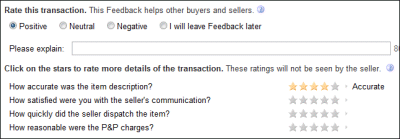The world’s biggest auction site has implemented a ratings system designed to promote high selling standards. Unfortunately, its effect is to punish good sellers as well as bad.
Here’s how it works. Buyers are invited to leave seller feedback after a transaction ends. They rate the transaction positive, negative or neutral, and then offer “Detailed seller ratings”. Buyers are asked to rate the transaction in four categories: description, communication, speed of dispatch, and fairness of p&p charges:

The difference between a four and five star rating is that for five stars the word “very” is added. For example, for communication you could be “satisfied” or “very satisfied”.
What the buyer does not know is that if the seller gets an average rating below 4.1, they can no longer list items for sale. If they are below 4.3, their listings may be “demoted” in search results. Here is the announcement from ebay.com:
What happens to sellers who do not meet the DSR requirements by November 3, 2008?
Sellers with a DSR below 4.1 will be blocked from listing on eBay.com. Sellers with a DSR below 4.3 but higher than 4.1 may have their listings further demoted in search results.
Sellers caught out by this are furious, partly because a buyer who awards 4 stars in all four categories is likely under the impression that they gave positive feedback. After all, what is the difference between “Accurate” and “Very accurate”? I am likely to do this myself, giving four stars if generally satisfied, and five for exceptional service.
The possibility of a seller getting banned from listing with an average four-star rating would not occur to me.
eBay’s intention seems to be to tilt the balance of its policies away from sellers and towards buyers. Another example of this is that sellers cannot give a fraudulent or unreasonable buyer negative feedback. However, it is the sellers who pay eBay’s fees, not the buyers, and it risks losing the goodwill of its customers.
In eBay-speak then, “satisfied” means “unsatisfied”.
eBay is a great site, but they have been doing lots of silly things recently, their new user interface is horrible and it takes me much longer to find what I want. This new rating system is the same, a bad idea. The problem is that they have a monopoly and so there are no real alternatives. Therefore they can do what they want and no one can do a thing about it.
Monopolies suck.
Gary
I think this could be easily avoided bu using a 7 point scale instead of a 5. People tend to avoid the extremes when providing feedback.
A 7 point scale! So it would be accurate, more accurate, very accurate or some such nonsense.
The problem could be easily avoided if eBay were to figure out that 4 stars is a good rating.
Tim
eBay rarely is on the side of the seller. I have seen violations by buyers of eBay’s policies, and eBay takes the buyer’s side. It’s not a seller friendly site.
The 7 point scale is funny. “This one goes to 7.”
In April 2009 DSR hit the United Kingdom and we were one of the first casualties. This was due, in a large part, to us receiving low stars for such things as our postage rates being evry unreasonable on items which had free postage. Rather than have to address the issues we raised eBay have simply removed the DSRs and stated that “If it is a buyers opinion that “Free” is “Very Unreasonable”, “Then that buyer, should be allowed to have that opinion”. Whilst we may agree on the opinion bit (after all we do live in a free world…Don’t we eBay?) we must object when we are effectively punished for that opinion rather than anything factual and justifiable…
We need one big voice and then, maybe then, eBay will listen to the sellers and buyers who really thing that this is all wrong, immoral and indefensible.